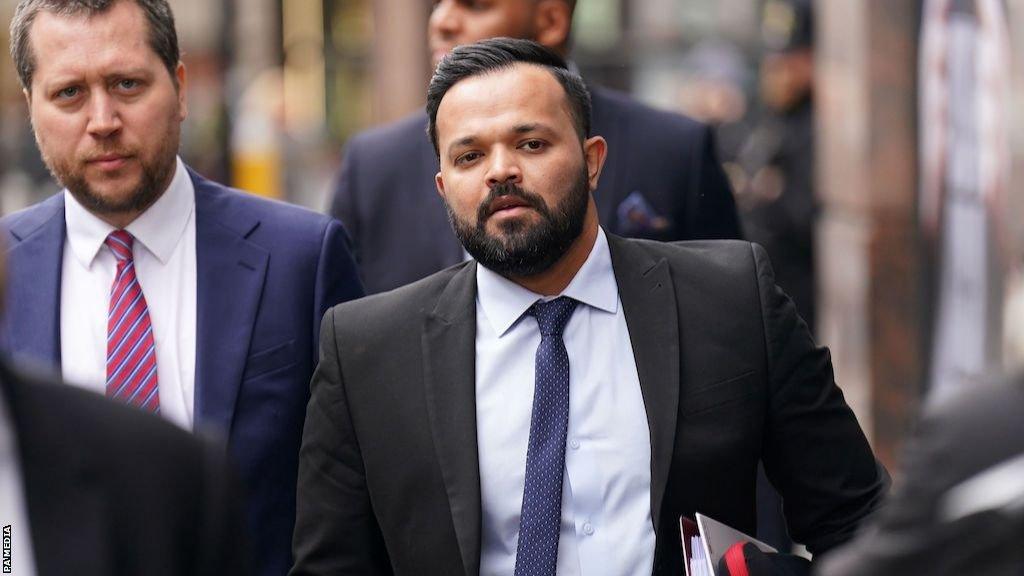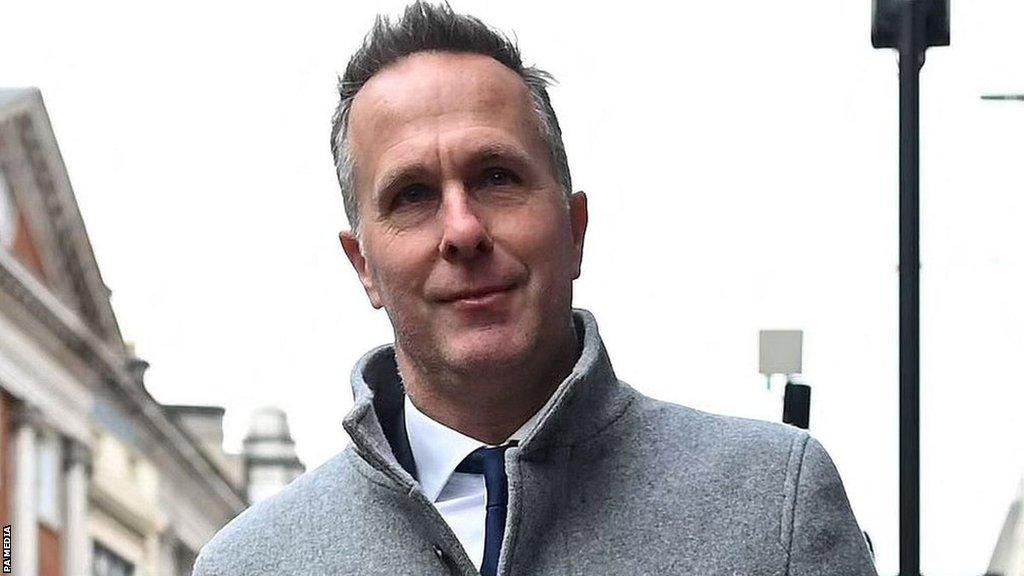Yorkshire racism hearing: Cricket awaits judgement in divisive episode
- Published

Azeem Rafiq arrives at the hearing on Tuesday
Never before has a judgement of the Cricket Discipline Commission carried such significance - as one of the most divisive and damaging episodes the English game has seen approaches a conclusion.
During the week of proceedings at the International Arbitration Centre on London's Fleet Street, former player Azeem Rafiq, the key witness in the Yorkshire racism scandal, said speaking out about discrimination meant "your life and career can be destroyed".
Defendant Michael Vaughan's lawyer used similarly stark language when describing how, for his client, "the shape of his life to come and his livelihood is at stake". Former England and Yorkshire captain Vaughan denies a charge of using racist language.
The CDC's sanction of suspension is irrelevant to defendants who are former players, as all but one of the seven individuals charged are. The other, Gary Ballance, accepted his charge but now plays outside the authority of the CDC in Zimbabwe.
The England and Wales Cricket Board (ECB) could theoretically decide to ban the defendants from cricket grounds under its jurisdiction if they are found guilty by the CDC of using racist language and bringing the game into disrepute. But sanctions must be proportionate, and such a punishment is thought unlikely.
Perhaps more importantly, it is reputations that will hinge on the decision reached by the panel in the next three weeks.
Having stepped back from his BBC broadcasting career after being charged, the clear suggestion from Vaughan's own legal team is that his prospect of resuming such work will be dictated by whether or not the panel believes it is more likely than not that he said the infamous "you lot" comment 14 years ago.
Vaughan is accused of saying "there's too many of you lot, we need to have a word about that" to Rafiq and three other Asian players representing Yorkshire before a T20 match against Nottinghamshire in 2009.
A bruising and highly damaging affair
Whatever the outcome, this has already been a bruising and highly damaging affair for one of the highest-profile figures in the sport, with what he accepted were "disgusting" historical social media posts about foreigners described as "central" to the evidence against him by the prosecution.
Having been accused of a "woefully inadequate" investigation that was "an affront to fairness", a "prosecution from the outset" and even bias by Vaughan's lawyers on a dramatic final day of the hearing on Tuesday, the credibility and integrity of the ECB's regulatory process also rests on what the panel concludes. Especially with several defendants refusing to turn up to the hearing, also citing concerns over fairness, and one of those - former Yorkshire head coach Andrew Gale - accusing the governing body of orchestrating a "witchhunt".
There have been further suggestions in some quarters that the ECB may have been rattled by the criticism it received by politicians as this scandal ignited in late 2021, and put pressure on Yorkshire to dismiss staff. Outgoing Yorkshire chairman Lord Kamlesh Patel said in an interview that he was "asked by the ECB to ensure some people who were there from the previous regime did not take part in that governance process".
The ECB's lawyers said any suggestions of bias were "inappropriate" and "simply wrong", and it can point to the systemic racism that Yorkshire have admitted to during a prolonged period, the discriminatory language that former players Ballance and Matthew Hoggard have accepted they used while there, and the original Yorkshire investigation that found Rafiq had been racially abused, when arguing that it was absolutely right that it pursued the case that it did.
But many will also feel that after a legal process that has cost millions of pounds, and a saga that has caused the game unprecedented pain, they are no closer to truly knowing whether Vaughan said the words he stands accused of saying 14 years ago or not, or indeed what precisely went on during those years when Rafiq played at Headingley.

Vaughan retired from playing in 2009
A hearing that should have been avoided or long-overdue scrutiny?
Vaughan himself said this case could and should have been avoided. "This is not the right process to deal with word-against-word comments from 14 years ago. Ex-team-mates fighting it out over hearsay is a terrible look for the game," he said.
But others insist the transparency and accountability that this hearing has finally brought - and the scrutiny applied to the defendants, the ECB and key witnesses was necessary and long overdue.
Having admitted to all four charges they faced, Yorkshire - the most successful county in the history of English cricket - will hope they can overcome the severe financial challenges they now face, and the fines and/or points deductions they are handed, and finally recover from a scandal that brought the county to the brink of ruin.
But questions over its handling of this scandal, the decision to sack 16 members of staff in the aftermath of Rafiq's allegations (which could have cost Yorkshire £1.9 million in compensation payments having admitted the dismissals were "procedurally unfair"), the way ECB charges were amended and accepted, and the mysterious deletion of evidence related to allegations of racism will remain.
There is much at stake for Rafiq too, of course, who himself received a formal reprimand last year from the CDC for "racist and discriminatory conduct" relating to historical social media posts.
His whistleblowing two and half years ago has been hailed by the ECB and many others who have credited him with forcing cricket to confront its issues with racism, and its record on diversity and inclusion, but his evidence in this case was described by Vaughan's lawyers as "not sufficiently reliable".
This is a significant moment for current player Adil Rashid too, who corroborated Rafiq's claim via live video link from Bangladesh in between England matches, but whose evidence was again dismissed by the Vaughan side as "unreliable" amid suggestions he had been pressured by Rafiq.
And so all parties await the judgement. But with the burden of proof in this case based on a balance of probability (rather than beyond all reasonable doubt - as in a criminal case), it is highly unlikely that whatever ruling is reached will bring true closure.
The sport is also braced for the imminent publication of a landmark report by the Independent Commission for Equity in Cricket that has received thousands of responses, and which is expected to draw some painful conclusions that the game has serious institutional issues with race, gender and class that must be addressed if current under-representation is to be tackled.
Last year the new ECB chairman Richard Thompson said he predicted it would be "a challenging moment" for the game, as he vowed to make cricket the country's most inclusive sport.
The disciplinary commission panel will announce its verdict this month. But the intense scrutiny on English cricket is set to remain.